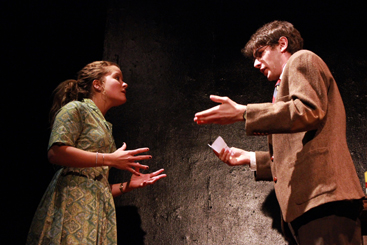It’s Linguistics and Love in Julia Cho’s “Language Archive;” Intime Production Shows That Words Just Can’t Bridge the Gaps


COMMUNICATION GAPS: Mary (Erin O’Brien, left) leaves anonymous notes about “the fragility of their marriage,” as she prepares to leave her husband, and George (Chris Littlewood), a linguist, can’t find the words to convince his wife to stay, in Theatre Intime’s production of Julia Cho’s “The Language Archive” at the Hamilton Murray Theater on the Princeton University campus through March 1.
The central dilemma and reigning irony of Julia Cho’s The Language Archive, is that George, a linguist, scholar and preserver of dead and dying languages, can’t come up with the words he needs to say to his wife Mary to keep her from leaving him.
Currently playing at Theatre Intime on the Princeton University campus, The Language Archive, a 2010 off-Broadway hit, combines farcical humor with emotional depth, absurdity with poetry, and some thought-provoking reflections on love and language, eating, and Esperanto.
The five-member Intime undergraduate ensemble, under the direction of Princeton University junior Annika Bennett, is capable and, for the most part, up to the challenges of this wild, 20-scene play, but some problems with staging and diction need further attention in order to make all these whirlwind scenes clear to the audience.
As George (Chris Littlewood) struggles to deal with the sudden departure of his wife Mary (Erin O’Brien) he shares with the audience his despair and bewilderment. He also speaks eloquently of his dedication to recording and saving languages before they disappear. He is devastated by the loss of his wife, but until this point in his life, the death of languages — “we are talking about a whole world, a whole way of life. It is the death of imagination, of memory.” — has affected him much more deeply than any human loss. The playwright, the child of Korean immigrants, grew up in Los Angeles and never learned Korean. Ms. Cho has stated that this play was inspired by her sense of loss at never having learned the language her parents spoke.
Meanwhile in the language laboratory, the Language Archive, George remains oblivious to the fact that his young assistant Emma (Emily Hornsby) has fallen deeply in love with him. Amidst these serious emotional tensions, enter Resten (David Drew) and Alta (Abby Melick) from somewhere overseas, long-time married couple and last surviving speakers of Elloway. This duo, in the tradition of the bickering Bickersons, the Honeymooners and Al and Peg Bundy of Married with Children, threaten to steal the show with their hilarious verbal sparring. To George’s chagrin, they insist on speaking in English, claiming that the language lends itself most effectively to the expression of their hostile sentiments towards each other.
As the plot proceeds in absurdist, rollercoaster fashion, it develops a sharper focus on Emma — in her Esperanto lessons with her histrionic instructor/confidante (also Ms. Melick); in an encounter with Mary, who has become a baker; in a fantasy meeting with the founder of Esperanto (also Mr. Drew), an eye doctor who tries to persuade her to fall out of love; and in her ongoing, unbalanced relationship with George. The plot also continues to follow Resten and Alta, and George and Mary.
Though at times difficult to understand with their heavily accented lines, Mr. Drew and Ms. Melick create vivid, larger-than-life characters in Resten and Alta and deliver the boisterous humor that carries this show. Their comic timing is excellent, as is their versatility in creating an array of additional supporting characters.
Mr. Littlewood portrays a convincing academic, passionate in his linguistic pursuits and mostly detached, becoming even pitiful, in his personal relationships. Ms. O’Brien’s frustrated, unhappy wife wins some sympathy in her separation from George and later fulfillment in her bake shop.
Ms. Hornsby’s Emma, despite some diction lapses when lines run together, develops as an interesting, appealing character, pursuing her true love with courage and dedication.
Set design by Michaela Karis proficiently provides six different playing areas to accommodate the multiple scene shifts during the course of the evening and to represent different locales: language lab, George’s study, train station (later becomes the bakery), hospital room, and language instructor’s office. The upstage areas, however, office and hospital room, are too far removed for optimum character projection and comprehensibility.
Ms. Bennett has directed this sweet, funny, intelligent play with understanding and sensitivity. Balancing humor and serious feeling is difficult here. The coolness of the protagonist, the multiplicity of scene shifts, and the often dominant farcical element do compromise the best efforts of this promising young playwright and the dedicated Intime ensemble to establish significant emotional depth. It is difficult to care as much as the play wants us to about the passions of George and Mary and even Emma, but The Language Archive provides an entertaining, stimulating evening, with some first-rate humor.
“The Language Archive” will run for one more weekend, with performances Thursday and Friday, February 27-28, at 8 p.m. and Saturday, March 1 at 2 and 8 p.m. For tickets and information visit www.princeton.edu/utickets or www.theatreintime.org or call (609) 258-5155.

